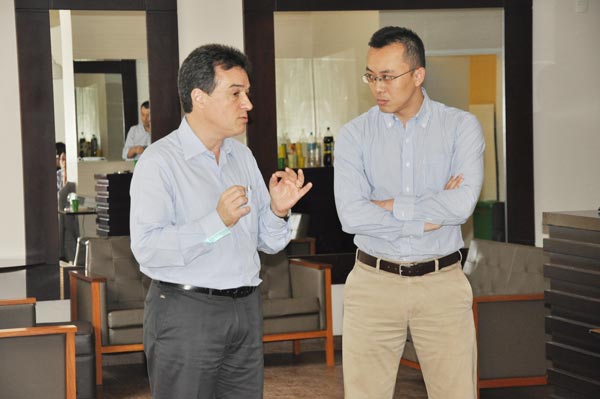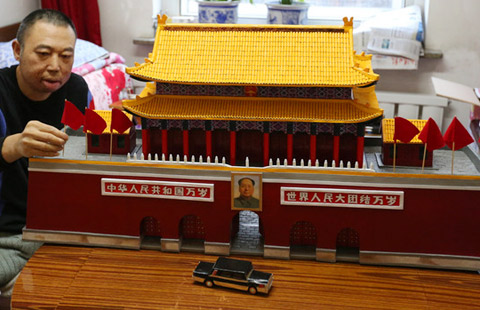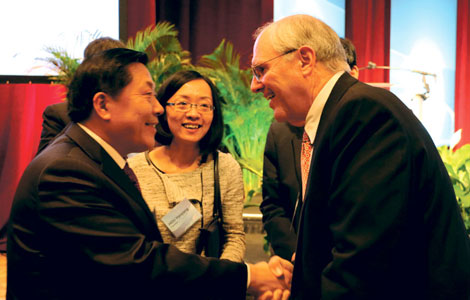Chinese investors in Brazil told to avoid risks
Updated: 2014-12-08 04:03
By JI YE in Rio de Janeiro(China Daily Latin America)
|
||||||||
 |
|
President of the MA8 Management Consulting Group Ltd Orlando Merluzzi(left) talked with representative of the MA8 Management Consulting Group Ltd in China Zhang Wei at a salon on risks that Chinese companies should avoid when entering Brazil’s market. Wang Zhengrun / Xinhua |
As trade between Brazil and China has prospered in recent years, more Chinese companies are investing in Latin America's largest country, which has great potential as well as challenges.
How to succeed in the Brazilian market, specifically what risks to avoid,was the topic of a salon discussion for Chinese professional managers on Nov 29 in Sao Paulo.
Orlando Merluzzi, president of the MA8 Management Consulting Group Ltd, pointed out four things to avoid to the gathering.
The first is incorrectly entering the market.
"A suitable and proper way for a company to enter the Brazilian market is very important, otherwise you have to pay a high price in the future,"said Orlando, who has many years' experience in the automotive industry.
A company should stay away from business opportunists and select a professional partner, and offer quality products to establish a good brand, he said. "You also have to make a long-term developing strategy once you decide to enter the Brazilian market."
The second is problematic contracts.
Brazilian laws are complex, with some of them not in line with general laws. A lawyer should review any contract before it is signed to avoid legal problems and possible financial losses.
Orlando said the third is cultural misunderstandings.
Brazil has a unique culture and Chinese companies investing in the country should abandon the Chinese business model and not copy successful experiences they might have had in Europe, North America or Africa. Instead, they need to adapt to the Brazilian ways of doing business and gain an in-depth understanding of the culture so they can eventually combine their own cultural characteristics and the local culture.
Orlando's comments on the need to understand Brazil's culture were echoed by Manuel Martins, president of the Association of Foreign Journalists in Brasilia, who noted that while Brazilians show strong external passion, their hearts are "sensitive and proud". "The cultural differences between Brazil and China are so huge that even a casual move could impact the confidence that has been built by both sides for a long time,"he said.
False promises is the last point that needs attention from Chinese investors.
Orlando said that Brazilian states often make attractive promises to get investments, including free land, tax relief or favorable loan conditions, and that companies need to make certain any promises can be kept.
"For instance, the Rio de Janeiro state government had promised to give free land to a company, but the company later got to know that this land had very strict environmental constraints so that it is impossible to build factories on this land,"said Orlando.
Another participant in the salon, Zhang Jun from Brazil's Demarest Adogado law firm, reminded the managers that some Chinese companies always prefer to use some irregular way to avoid tax when they first enter the Brazilian market, which is likely to bring large fines.
He suggested that Chinese companies investing in Brazil strictly adhere to the laws and not seek shortcuts that could lead to huge financial losses. Chinese companies should study the legal and tax environment and also understand how the local market works, he said.
"Only if you have an in-depth understanding of the local market and know how the market runs, can you effectively avoid the risks and reap the benefits," he said.
Yue Haiping, director general of the Association of Chinese Professional Managers in Brazil, reiterated to the managers the great potential of the Brazilian market for Chinese companies and the need for them to find their own business model and avoid risks when they first enter Brazil.
The salon was the third event held by the Association of Chinese Professional Managers in Brazil. Yue said he hoped it could help Chinese companies communicate with each other and avoid following wrong ways.

 China, Brazil pledge to promote science, technology co-op
China, Brazil pledge to promote science, technology co-op
 Jack Ma awarded Honorary Chairman of Zhejiang Chamber of Commerce
Jack Ma awarded Honorary Chairman of Zhejiang Chamber of Commerce
 South China's 'little Africa'
South China's 'little Africa'
 Trending: Eiffel Tower replica in Hangzhou
Trending: Eiffel Tower replica in Hangzhou
 Detailed models made from rice and trash
Detailed models made from rice and trash
 China, South Africa sign economic pacts
China, South Africa sign economic pacts
 Across America over the week (Nov 28- Dec 4)
Across America over the week (Nov 28- Dec 4)
 US official praises China's role in counter-piracy
US official praises China's role in counter-piracy
Most Viewed
Editor's Picks

|

|

|

|

|

|
Today's Top News
Chinese investors in Brazil told to avoid risks
Chinese role expected in Mexico's energy reform
Peruvian product hit in Chinese market
Brazil film festival delights Beijing and Shanghai
Chinese, Brazilian presidents pledge to promote science, technology cooperation
2014 Yearender: Life underground
Kid killed in SW China earthquake
China's stock market value surges
US Weekly

|

|







